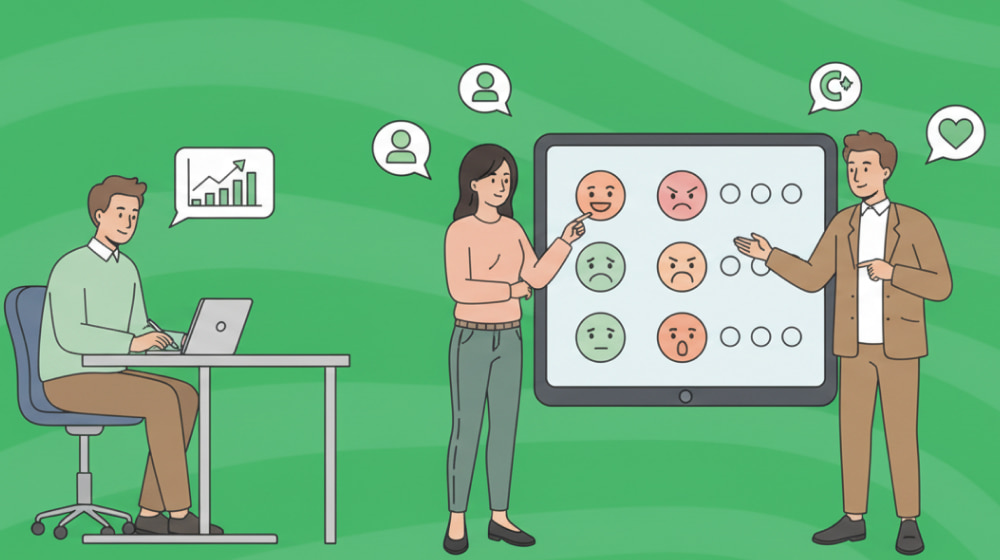Testing Real Emotional Skills With EQ Test
Emotional intelligence drives how we perceive cues, navigate conflict, and build trust, which makes it a decisive factor in careers and relationships alike. Beyond personality or IQ screens, an emotional intelligence test gauges how you perceive, understand, use, and manage emotions in real situations. Leaders who master these capabilities tend to communicate with clarity, diffuse tension early, and inspire discretionary effort in others.

Real-World EI Skills
Foundational self-knowledge also supports wellbeing by reducing rumination and stress reactivity. If you are just exploring the topic, an engaging emotional intelligence quiz can introduce the core ideas without heavy jargon. As you translate insights into habits, micro-practices such as naming emotions, journaling triggers, and pausing before replying make the shift visible to others.
Start the TestChoosing the Right Emotional Intelligence Test
Different contexts call for different instruments, from brief screeners to multi-hour batteries with robust norms. Time-pressed teams sometimes start with a concise quick emotional intelligence test to spark discussion and identify priorities. As stakes rise, for selection, leadership pipelines, or succession, organizations usually upgrade to more rigorous and benchmarked approaches.
| Format | What it Measures | Best For | Estimated Time | Notes |
|---|---|---|---|---|
| Ability-based tasks | Perception, understanding, regulation of emotions | Leadership development, talent identification | 45–90 minutes | Objective scoring; stronger psychometrics |
| Self-report inventory | Traits, habits, and self-beliefs about EI | Self-coaching, team workshops | 10–25 minutes | Fast and accessible; risk of self-bias |
| 360-degree feedback | Observed behaviors across rater groups | Managers, cross-functional leaders | 30–60 minutes | Context-rich; requires careful rollout |
| Hybrid models | Blend of abilities and competencies | Broad development initiatives | 20–60 minutes | Balanced view; check validation evidence |
Remote teams benefit from flexible delivery and immediate feedback loops. For remote learners, a convenient emotional intelligence test free online can reduce friction and increase participation across time zones. Whatever you choose, ensure documentation addresses norms, bias mitigation, and scoring transparency. HR leaders care about defensibility when results inform hiring or promotion. HR leaders should verify reliability and validity whenever they adopt psychometric tests of emotional intelligence for selection or development. That diligence protects candidates, preserves trust, and improves the signal-to-noise ratio of your decisions.
-
![]() Improved conflict resolution and more productive feedback loops
Improved conflict resolution and more productive feedback loops -
![]() Faster onboarding through better rapport and inclusive behaviors
Faster onboarding through better rapport and inclusive behaviors -
![]() Higher resilience amid change and tighter deadlines
Higher resilience amid change and tighter deadlines
MSCEIT and Other EI Tools for Development
Good assessments do more than label; they reveal patterns you can train, observe, and reinforce in daily work. When budgets are tight, a reputable free emotional intelligence test can offer a useful baseline before you invest in pro-grade options. Still, you should understand what the instrument measures, how results are scored, and whether its reliability has been verified across diverse populations.

Some instruments emphasize ability, using objective tasks instead of self-views. Among ability measures, the well-researched MSCEIT models emotion perception, facilitation, understanding, and regulation through objective tasks. Other tools adopt mixed models that blend traits, behaviors, and competencies into a broader profile. Workplaces often seek practical guidance that links scores to action. In workplace programs, the practical emotional intelligence appraisal test often pairs results with development plans and coaching exercises. Regardless of format, the most useful reports translate findings into real scenarios, giving feedback, leading change, and handling setbacks, so the path from insight to practice is obvious.
-
![]() Perceiving, using, understanding, and managing emotions
Perceiving, using, understanding, and managing emotions -
![]() Combining traits, attitudes, and behavioral tendencies
Combining traits, attitudes, and behavioral tendencies -
![]() Integrating others’ observations for richer context
Integrating others’ observations for richer context

Preparing for MSCEIT
Your choice should reflect purpose, time, and the depth of insight you need, not just brand familiarity. If your goal is scientific rigor, the renowned Mayer-Salovey-Caruso emotional intelligence test aligns with the four-branch model of emotional abilities. For team learning, you might favor tools that produce shared language, clear behavioral anchors, and group-level heatmaps.
Start the Test-
![]() Clarify your goal: selection, development, or team culture building
Clarify your goal: selection, development, or team culture building -
![]() Check psychometric quality: reliability, validity, and fair norms
Check psychometric quality: reliability, validity, and fair norms -
![]() Plan logistics: timing, communications, confidentiality, and consent
Plan logistics: timing, communications, confidentiality, and consent

Sampling before committing is smart, especially when rolling out at scale. Learners who want to sample different formats can rotate through a reputable free emotional intelligence test online before committing to a longer assessment. During pilots, collect feedback on clarity, cultural relevance, and the usefulness of coaching guidance. Short icebreakers and reflective exercises can prime participants for deeper self-observation. For classroom warm-ups, a short emotional intelligence quiz free can kickstart reflection and lower the barrier to entry.
Start the TestAccessing to Online Emotional Intelligence Test
Numbers alone don’t move behavior; interpretation and follow-through do. After you receive scores, a clear emotional intelligence test assessment should translate numbers into behaviors you can practice. The best debriefs link patterns to role demands, for example, negotiation prep, stakeholder updates, or difficult performance conversations.

Habits compound when you measure, reflect, and iterate. To make the insights stick, you might schedule micro-goals right after you test your emotional intelligence so momentum does not fade. Weekly check-ins, peer practice, and real-time debriefs after tough meetings create feedback cycles that accelerate growth.
Online Emotional Intelligence (EQ) Test
Get StartedFrequently Asked Questions
- What is emotional intelligence in practical terms?It is the capacity to notice, understand, and use emotions to guide thinking and action. In practice, that means reading context, regulating reactions, and choosing responses that advance goals while preserving relationships. These skills can be learned with consistent, focused practice.
- How long do typical assessments take to complete?Self-report inventories can be finished in under 20 minutes, while more rigorous ability measures may take an hour or longer. Time varies by depth, number of scales, and whether observer feedback is included. Plan extra time for instructions and a thoughtful debrief.
- Are results reliable and fair across cultures?Quality instruments publish reliability and validity data, including normative samples and fairness analyses. Look for documentation on translation procedures, measurement invariance, and local norms where available. Inclusive rollout practices further reduce bias and improve participant trust.
- How should I prepare before taking an assessment?Schedule a quiet block, silence notifications, and read instructions carefully. Approach items honestly, focusing on typical behavior rather than idealized responses. If possible, plan a follow-up session to convert insights into specific actions.
- What should I do after receiving my report?Identify two priority behaviors to build, then commit to small, daily repetitions that embed the new patterns. Ask a colleague to observe and give feedback on one behavior at a time. Revisit progress after a few weeks and refine your plan based on what you learn.
The Latest News
 The Complete Guide to Measuring Emotional Intelligence for Personal and Professional Growth Online Emotional Intelligence (EQ) Test Get Started What Emotional Intelligence Measurement Really Captures Emotional intelligence sits at the intersection of self-awareness, self-regulation, empathy, and social fluency, giving people the capacity to navigate complexity with composu...
The Complete Guide to Measuring Emotional Intelligence for Personal and Professional Growth Online Emotional Intelligence (EQ) Test Get Started What Emotional Intelligence Measurement Really Captures Emotional intelligence sits at the intersection of self-awareness, self-regulation, empathy, and social fluency, giving people the capacity to navigate complexity with composu... - 12 November, 2025
- Your Complete Guide to Measuring Emotional Intelligence at No Cost Online Emotional Intelligence (EQ) Test Get Started Understanding Emotional Intelligence and Why Measurement Matters Emotional intelligence is the capacity to perceive, understand, use, and manage emotions effectively in yourself and in others. Unlike static traits, these capabiliti...
- 11 November, 2025
- Comprehensive Guide to EQ Assessments for Self-Awareness, Relationships, and Performance Online Emotional Intelligence (EQ) Test Get Started What an EQ Assessment Measures and Why It Matters Emotional intelligence sits at the crossroads of self-awareness, empathy, and the ability to manage stress and conflict. A well-constructed assessment helps you decode how you notic...
- 10 November, 2025
Please Note
This website (emotional-intelligence-hub.com) is not an official representative, creator or developer of this application, or product. All the copyrighted materials belong to their respective owners. All the content on this website is used for educational and informative purposes only.


